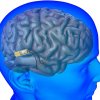.jpg)
The Defense Advanced Research Projects Agency (DARPA) is famous for funding the development of the Internet, stealth jets, and GPS. These days, the agency has been giving a lot more attention to the life sciences, and specifically to rehab medical technologies to assist soldiers coming home from battles. Naturally, DARPA has been sponsoring prosthetic limb technologies, with the DEKA Luke Arm recently receiving FDA approval being a major achievement. Now DARPA is aiming for the brain with the hope of developing technologies to help restore memory.
Brain injury and various neurological diseases prevent neurons from passing their signals properly, often causing memory loss and an inability to retain new memories. To address this, DARPA has allocated $2.5 million to the Lawrence Livermore National Laboratory to develop neural implants able to both record signals coming from neural tissues (single neuron and local field potential recordings) and stimulate others in real time to effectively reconnect damaged sections of the brain. The closed-loop implantable system will initially be used to study how the regions of the brain responsible for memory operate. It will be able to process 64 channels of data coming from a pair of high density electrode arrays. An externally worn device around the ear will be able to communicate with the implant to receive readings and control its functionality.
More from LLNL:
Designed to last throughout the duration of treatment, the device’s electrodes will be integrated with electronics using advanced LLNL integration and 3D packaging technologies. The microelectrodes that are the heart of this device are embedded in a biocompatible, flexible polymer.
Using the Center for Bioengineering’s capabilities, Pannu [LLNL's project leader Satinderpall Pannu, director of the LLNL's Center for Bioengineering] and his team of engineers have achieved 25 patents and many publications during the last decade. The team’s goal is to build the new prototype device for clinical testing by 2017.
Lawrence Livermore’s collaborators, UCLA and Medtronic, will focus on conducting clinical trials and fabricating parts and components, respectively.
“The RAM program poses a formidable challenge reaching across multiple disciplines from basic brain research to medicine, computing and engineering,” said Itzhak Fried, lead investigator for the UCLA on this project and professor of neurosurgery and psychiatry and biobehavioral sciences at the David Geffen School of Medicine at UCLA and the Semel Institute for Neuroscience and Human Behavior. “But at the end of the day, it is the suffering individual, whether an injured member of the armed forces or a patient with Alzheimer’s disease, who is at the center of our thoughts and efforts.”
Source:DEKA Luke Arm

